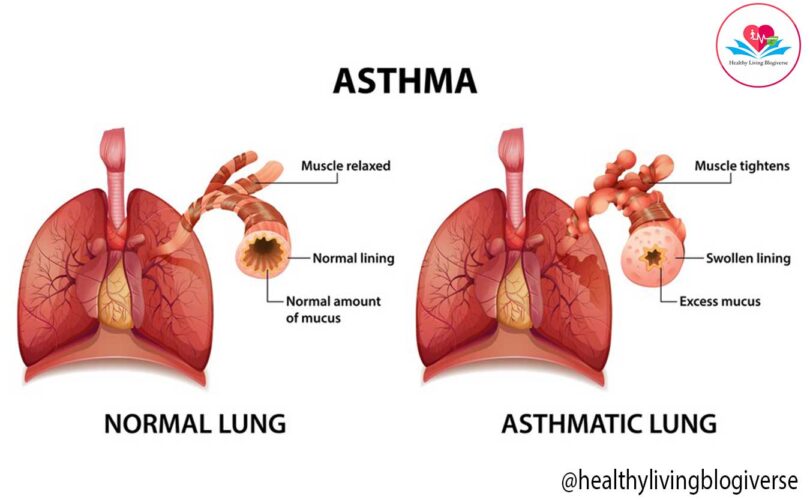Asthma is a chronic respiratory condition that affects the airways, causing inflammation and narrowing. This leads to symptoms such as wheezing, shortness of breath, chest tightness, and coughing. Asthma can vary in severity and is often triggered by factors like allergens, exercise, stress, or irritants. While there is no cure for asthma, it can be effectively managed with medication and lifestyle modifications to allow individuals to lead active and fulfilling lives. Regular monitoring of symptoms and working closely with healthcare professionals to develop an asthma action plan are key to maintaining good respiratory health.

Symptoms of Asthma
- Shortness of breath
- Chest tightness or pain
- Wheezing when exhaling
- Coughing or wheezing attacks that are worsened by a respiratory virus, such as a cold or the flu
- Difficulty sleeping due to coughing, wheezing, or shortness of breath
- A whistling or wheezing sound when exhaling (wheezing is a common sign of asthma in children)
- Coughing or wheezing attacks that are triggered by allergies or exposure to allergens, such as dust, pet dander, or pollen
- Rapid breathing
- Feeling tired or weak during asthma attacks
- Difficulty speaking in full sentences due to shortness of breath
 | These symptoms may vary in intensity and frequency from person to person. It is important to consult with a healthcare professional for an accurate diagnosis and appropriate treatment plan. |
Causes of Asthma
The causes of asthma can vary from person to person, but here are some common triggers and risk factors:
- Allergies: Allergic reactions to substances such as dust mites, pollen, pet dander, mold, and certain foods can trigger asthma symptoms.
- Genetics: Asthma often runs in families, suggesting a genetic predisposition to the condition. If one or both parents have asthma, the risk of a child developing it is higher.
- Environmental Factors: Exposure to air pollution, tobacco smoke, chemicals, and strong odors can irritate the airways and trigger asthma symptoms.
- Respiratory Infections: Viral infections of the respiratory system, such as the common cold or flu, can worsen asthma symptoms or even lead to an asthma attack.
- Occupational Exposure: Certain workplaces, such as those involving chemicals, dust, or fumes, can increase the risk of developing occupational asthma.
- Exercise-induced Asthma: Strenuous physical activity can trigger asthma symptoms in some individuals, known as exercise-induced asthma.
- Emotional Factors: Stress, anxiety, and strong emotions can sometimes lead to asthma symptoms or worsen existing symptoms.
- Weather Changes: Cold air, humidity, or sudden weather changes can act as triggers for asthma symptoms.
Understanding the Risk Factors of Asthma:
While the exact cause of asthma is unknown, there are several risk factors that have been identified. Understanding these risk factors can help individuals identify potential triggers and take steps to manage the condition effectively.
- Genetic predisposition: Asthma tends to run in families, suggesting a genetic component to the condition. If you have a family history of asthma or allergies, you may be at a higher risk of developing asthma.
- Allergies: Allergic reactions to substances like pollen, dust mites, animal dander, and certain foods can trigger asthma symptoms. People with allergies are more likely to have asthma or develop it later in life.
- Environmental factors: Certain environmental factors, such as exposure to tobacco smoke, air pollution, or occupational irritants, can increase the risk of developing asthma or exacerbating existing symptoms. Occupational asthma is particularly common in individuals who work in industries exposed to chemicals, dust, or fumes.
- Respiratory infections: Severe respiratory infections, especially during early childhood, can contribute to the development of asthma. Viral infections like the common cold or respiratory syncytial virus (RSV) can trigger asthma attacks in some individuals.
- Obesity: Obesity has been linked to an increased risk of asthma, as excess weight can put additional pressure on the lungs and airways.
- Physical activity: Some individuals may experience exercise-induced asthma, where physical activity triggers asthma symptoms. This can happen due to the increased airflow and cooling of the airways during exercise.
- Stress and emotions: Emotional stress and intense emotions can sometimes trigger asthma symptoms or worsen existing ones.
It’s important to remember that while these risk factors can increase the likelihood of developing asthma, not everyone with these factors will develop the condition. Additionally, asthma triggers can vary from person to person, so it’s important for individuals with asthma to identify and manage their specific triggers in consultation with a healthcare professional.

Asthma Prevention: Taking Control of Your Respiratory Health
The prevention of asthma is an important aspect of managing the condition. While there is no definitive way to prevent asthma, there are several steps you can take to reduce the risk of developing asthma or to minimize its impact. Here are some key strategies for asthma prevention:
- Avoid triggers: Identify and avoid the triggers that can worsen asthma symptoms. Common triggers include allergens (such as pollen, dust mites, and pet dander), irritants (such as cigarette smoke and strong odors), and respiratory infections.
- Maintain good indoor air quality: Keep your living environment clean and free from allergens. Regularly clean your home, vacuum carpets and upholstery, and consider using air filters to reduce indoor pollution. Keep windows closed during peak pollen seasons and use allergen-proof covers on pillows and mattresses.
- Practice good hygiene: Wash your hands frequently to reduce the risk of viral and bacterial respiratory infections, which can trigger asthma symptoms. Encourage proper hygiene practices in children and teach them to cover their mouths and noses when coughing or sneezing.
- Get vaccinated: Make sure you and your family members are up-to-date with vaccinations, especially for respiratory infections such as influenza and pneumonia. Vaccinations can help prevent these infections and their potential impact on asthma.
- Follow a healthy lifestyle: Maintain a balanced diet, exercise regularly, and get enough rest. A healthy lifestyle can strengthen your immune system and overall respiratory health, which may help reduce the risk of asthma or its severity.
- Manage stress: Stress and strong emotions can sometimes trigger asthma symptoms. Find healthy ways to manage stress, such as through relaxation techniques, exercise, and engaging in activities you enjoy.
- Regular check-ups: Regularly see your healthcare provider, even if your asthma symptoms are well-controlled. They can monitor your condition, adjust your treatment plan if needed, and provide guidance on asthma prevention strategies.
Remember that each person’s asthma is unique, so it’s important to work closely with your healthcare provider to develop a personalized asthma management and prevention plan. By being proactive and taking steps to minimize your exposure to triggers, you can help reduce the frequency and severity of asthma symptoms.
Here are some key points to consider regarding when to see a doctor for asthma:
- Increasing frequency or severity of asthma attacks.
- Worsening shortness of breath unrelieved by medications.
- Nocturnal symptoms disrupting sleep.
- Rescue inhaler no longer providing relief.
- Frequent emergency room visits or hospitalizations.
- Declining peak flow readings.
- Exercise triggering asthma symptoms.
Regular communication with your doctor is vital for optimal asthma management.







